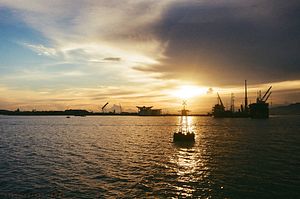On Monday, during a visit to Hanoi, Japanese Prime Minister Shinzo Abe pledged six additional patrols boats for Vietnam’s coast guard, reiterating a commitment first articulated by the Japanese leader in September 2016.
According to a Japanese official who spoke to Reuters, the vessels are valued at $338 million (38.5 billion yen) in total. Vietnam will receive a concessional loan to enable the purchase.
The Japanese prime minister’s stop in Hanoi this week concludes a Southeast Asian and Australian diplomatic tour. Abe also stopped over in Indonesia, the Philippines, and Australia during his current trip.
“We will strongly support Vietnam’s enhancing its maritime law enforcement capability,” Abe said in Hanoi, where he will remain until Tuesday.
Monday’s announcement dovetails with ongoing Japanese policy toward the region. On the sidelines of last year’s ASEAN-related summits in Vientiane, Laos, Abe conveyed Japan’s interest in continuing to bolster Vietnam’s maritime law enforcement and surveillance capabilities via a patrol boat sale.
In 2014, Japanese Foreign Minister Fumio Kishida pledged six used vessels for Vietnam’s coast guard, two of which were former Japanese Fisheries Agency patrol boats and four of which were regular commercial fishing boats.
The 2014 transfer was financed by Japan under an Official Development Assistance (ODA) package worth $4 million (500 million yen).
Notably, Kishida’s 2014 visit to Hanoi came in the aftermath of a flare-up in the South China Sea dispute between China and Vietnam after Beijing moved the Haiyang Shiyou 981 oil rig into disputed waters, leading to a months-long stand-off and temporary diplomatic freeze.
Since then, Japan and Vietnam have deepened defense consultations between the Vietnam People’s Army and Navy and Japan’s Self-Defense Force. In November 2015, Vietnam agreed to allow port calls by Japanese Maritime Self-Defense Force vessels at Cam Ranh Bay.
In April 2016, in a historic first, two Japanese destroyers made the country’s first-ever port call into Cam Ranh Bay International Seaport.
Japan does not have direct territorial or maritime entitlement stakes in the South China Sea dispute, but has long been an interested party in the area. Tokyo has strongly supported the resolution of disputes through peaceful means and has thrown its support behind the preservation of international rules and norms.
In July 2016, after a five-judge tribunal at the Permanent Court of Arbitration largely ruled against China in an arbitration case filed by the Philippines in 2013, Japan supported the ruling, calling on both Manila and Beijing to treat the ruling as “final and legally binding on the parties.”
In early 2013, shortly after Abe and the Liberal Democratic Party won in Japan’s December 2012 elections, Abe chose Southeast Asia as the site of his first visit abroad as prime minister in his second non-consecutive term, visiting Thailand, Vietnam, and Indonesia.

































